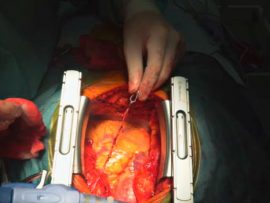Abstract Background Since the 2009 pandemic influenza, we have nationally established a committee of the extracorporeal membrane oxygenation (ECMO) project. This project involves adequate respiratory management for severe respiratory failure..
Read MoreAbstract Introduction: Postoperative delirium is the most common neurological complication of cardiac surgery. Hypoxia has been shown to increase the risk of postoperative delirium. The possibility to continuously monitor oxygen..
Read MoreAbstract When designing a clinical study, a fundamental aspect is the sample size. In this article, we describe the rationale for sample size calculations, when it should be calculated and..
Read MoreAbstract For 3 decades, the American College of Cardiology (ACC) and the American Heart Association (AHA) have jointly developed clinical practice guidelines in an effort to align patient care with..
Read MoreAbstract Introduction: Hypothermic circulatory arrest is widely used for correction of acute type A aortic dissection pathology. We present our experience of 45 consecutive patients operated in our unit with..
Read MoreAbstract Objectives: Minimal extracorporeal circulation techniques and systems (MiECC) may reduce the negative side effects of conventional extracorporeal circulation (ECC). However, it is still unclear as to what this is caused..
Read MoreAbstract Minimal invasive extracorporeal circulation (MiECC) has initiated important new efforts within science and technology towards a more physiologic perfusion. In this study, we aim to investigate the learning curve..
Read MoreAbstract What We Already Know about This Topic Cardiac surgery is associated with cognitive decline and postoperative delirium The relationship between postoperative delirium and cognitive decline after cardiac surgery is..
Read MoreAbstract Background Acute kidney injury (AKI) after cardiovascular surgery is a serious complication. Little is known about the ability of novel biomarkers in combination with clinical risk scores for prediction..
Read MoreAbstract OctaplasLG is indicated for use in patients undergoing cardiac surgery who require replacement of multiple clotting factors. The use of OctaplasLG over single-donor fresh frozen plasma (FFP) may have..
Read MoreAbstract Veno-venous (VV) extracorporeal membrane oxygenation (ECMO) is the most efficient technique for respiratory support. It is based on a patient adequate circulation and cardiac function and it is indicated..
Read MoreAbstract Extracorporeal membrane oxygenation (ECMO) is considered a recognized lifesaving support for patients with cardiorespiratory failure. Acute kidney injury (AKI) and fluid overload are significant morbidity factors resulting in serious..
Read MoreAbstract Open heart surgeries are common for treating ischemic and heart valve disease. During cardiac surgery, cardiopulmonary bypass (CPB) can temporarily take over the function of heart and lungs. However,..
Read MoreAbstract Extracorporeal membrane oxygenation (ECMO) is a life-saving technique that is widely being used in centers throughout the world. However, there is a paucity of literature surrounding the mechanisms affecting..
Read MoreAbstract Although many have studied the effects of pulsatile flow on extracorporeal circulation, its advantages remain controversial. One reason for this situation is that in most studies, pulsatility was evaluated..
Read MoreAbstract Femoral arterial cannulation in adult venoarterial (VA) extracorporeal membrane oxygenation (ECMO) predisposes patients to ipsilateral limb ischemia. Placement of a distal perfusion catheter (DPC) is one of few techniques available..
Read MoreAbstract Following cardiac surgery, hyperlactatemia due to anaerobic metabolism is associated with an increase in both morbidity and mortality. We previously found that an elevated respiratory quotient (RQ) predicts anaerobic..
Read MoreAbstract Introduction: Peri-operative monitoring of coagulation is important to diagnose potential cause of hemorrhage, to manage coagulopathy and guide treatment with blood products in patients undergoing cardiac surgery with cardiopulmonary bypass...
Read MoreAbstract Background: The aim of the present study was to investigate the relationship between maximum clot firmness (MCF) in rotational thromboelastometry (ROTEM®) and postoperative bleeding in patients on clopidogrel after..
Read MoreAbstract Background Acute kidney injury (AKI) is common after cardiac surgery and profoundly affects postoperative mortality and morbidity. There are no validated methods to assess risk of AKI intraoperatively. Methods..
Read MoreAbstract Background: Venoarterial extracorporeal membrane oxygenation (VA-ECMO) provides respiratory and hemodynamic support to pediatric patients in severe cardiac failure. We aim to identify risk factors associated with poorer outcomes in..
Read MoreAbstract Acute kidney after cardiac surgery is more common in anaemic patients, whereas haemolysis during cardiopulmonary bypass may lead to iron‐induced renal injury. Hepcidin promotes iron sequestration by macrophages: hepcidin..
Read MoreAbstract OBJECTIVES Minimally invasive aortic valve replacement (MIAVR) can be technically demanding and may lead to prolonged operative time. We evaluated the intraoperative and postoperative patient outcomes following implementation of..
Read MoreAbstract Retrograde lung vascular perfusion can appear in high‐risk surgeries. The present report is the first to study long‐term retrograde perfusion of isolated perfused mouse lungs (IPLs) and to use..
Read MoreAbstract Recently, side effects of plasma expanders like hydroxyethyl starch and gelatine gained considerable attention. Most studies have focused on the kidneys; lungs remain unconsidered. Isolated mouse lungs were perfused..
Read MoreAbstract The “stone heart” syndrome is a rare but often fatal complication of cardiac surgery associated with hypertrophy of the myocardium. The mechanisms behind the syndrome are not fully understood...
Read MoreAbstract Survival from out-of-hospital cardiac arrest (OHCA) has remained low despite advances in resuscitation science. Hospital-based extra-corporeal cardiopulmonary resuscitation (ECPR) is a novel use of an established technology that provides..
Read MoreAbstract OBJECTIVES Prolonged aortic cross-clamp (XCT) and cardiopulmonary bypass time (CPBT) are associated with increased morbidity and mortality following cardiac surgery. The aim of this study was to assess the..
Read MoreAbstract Background (CPB) induces a systemic inflammatory reaction that may contribute to . Preventing this reaction with steroids may improve outcomes. We performed a systematic review to evaluate the impact of..
Read More

























